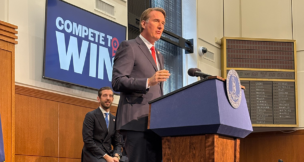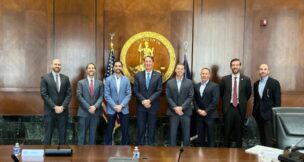Testing the waters
VCU goes back to school during the pandemic
At colleges across Virginia and the nation, this will be a fall semester like no other.
The coronavirus is turning campuses into petri dishes for experimentation.
One of the state’s largest public colleges with an enrollment of about 30,000 students in the heart of Richmond, Virginia Commonwealth University is also pivoting to confront the unprecedented challenges of creating a healthful learning environment amid a pandemic, with no rule book to follow.
And in many ways, VCU provides a microcosm of how universities are responding statewide.
For one VCU student, it’s unfolding like a scary movie.
“Personally, I feel it’s not going to be good at the end of the day, simply because cases are still going up and when everyone gets back to campus, it’s almost certainly going to explode,” says Udhanth Mallasani, interim president of the VCU Student Government Association.
“I can guarantee you students are going to interact with each other, even if it’s outside the classroom,” Mallasani says. “Campus is going to be a breeding ground for the disease.”
The 19-year-old biology major from Loudoun County is not only worried about his own health but that of his family, if he contracts COVID-19.
“I basically will not be able to go back home till there is a vaccine and a treatment and a level of normalcy because my mom has had a relapse from chemotherapy [and] her immunity is compromised,” Mallasani explains.
His grandparents are also at his home, he adds, and they’re at higher risk of death or hospitalization because of their age.
On the first day of classes in August, about 100 students protested VCU’s reopening during the pandemic. Within the first four days, VCU reported that 25 students and 11 employees tested positive.
Despite some of her fellow students’ misgivings, 20-year-old Laith Samamreh, a student representative on VCU’s COVID-19 response team, believes that universities could be part of the solution rather than part of the problem.
“My demographic is running amok, spreading it more than anybody else,” says Samamreh, a Vienna resident, alluding to gatherings referred to as “super spreader” events.
But she notes, “With increased testing, increased precautions, increased contact tracing, universities can help prevent the spread of the disease.”
In Virginia, Gov. Ralph Northam has said that people between the ages of 20 and 29 are now the most likely demographic to get COVID-19, due to not wearing masks or practicing distancing.
Historic deficit
Aside from creating widespread health problems, the coronavirus also has created financial hardships for some VCU students, Mallasani says, because the pandemic has wiped out the part- and full-time jobs many of them depend on to help pay for college. Restaurants, retail shops and other student workplaces are now less likely to have job openings.
“Some of my peers, they still haven’t been able to pay off their spring tuition because they don’t have a job anymore,” he says.
VCU says about 30% of its students qualify for federal Pell Grants, a subsidy for low-income students. To help students financially, VCU, for the second year in a row, did not raise tuition.
The university has also stepped up to assist students who didn’t have the necessary technology and connectivity to join the rapidly emerging digital community on campus as online classes expand.
“For this fall, we have allocated $1 million for students who have technology needs. We’ve received applications from over 300 students who say they need a computer or a laptop or funding to provide internet access,” says Tomikia P. LeGrande, vice provost for strategic enrollment management.
Additionally, VCU received $10 million in federal CARES Act funding to assist students suffering financial hardship during the pandemic. “Thus far, we have funded over 6,000 students,” LeGrande says.
The enrollment chief acknowledges that students and their families are more worried than ever about the costs of starting or continuing college in the throes of widespread unemployment.
While it was initially feared that student enrollment would drop by as much as 10%, LeGrande says that the university has made extensive efforts to keep in touch with students and families about protective measures and financial aid, which gives administrators hope the dip won’t be quite as deep.
When students returned in August, enrollment was down by 1.17%, or 331 students fewer than in 2019. The university’s 2020-21 budget projected a potential revenue hit of $41.4 million due to enrollment losses.
“Our projected budget deficit is of historic proportions,” VCU President Michael Rao wrote in a May message to the university community. “The costs associated with COVID-19 are enormous. In mid-April they eclipsed $50 million, including $13 million in lost revenue principally due to refunds and credits to students. These costs are mounting every day.”
The refunds and credits were prompted when VCU, like universities across the state, closed its dormitories last spring because of the coronavirus pandemic and moved to online instruction.
Budget roller coaster
To stem revenue losses, VCU is circling its wagons.
The university has instituted a hiring and salary freeze and made targeted reductions universitywide to balance its budget.
The measures are expected to yield $11 million in savings; strategic school and administrative reductions will yield an additional $18.1 million; reallocating auxiliary fund balances, $10.1 million; and, a one-time use of contingency funds, $15.6 million.
In total, those measures are expected to create savings of $55 million, according to the university’s budget.
Other measures could be taken as the school year continues and conditions warrant. In July, VCU suggested that, if it becomes necessary, the university may furlough employees, including President Rao, who earned $741,073 in 2019. So far, none of the university’s executives have taken pay cuts as William & Mary’s administration has done.
As of press time for this issue, it was not clear whether VCU and other state universities might receive additional state funding or see further cuts. The General Assembly convened its Aug. 18 special session to adopt a budget based on revised state revenue forecasts in light of the ongoing COVID-19 pandemic.
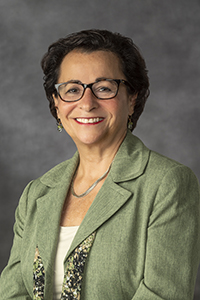
Karol Kain Gray, senior vice president and CFO at VCU, has only one way to describe the preparation of this year’s budget.
“Do you like roller coasters?” she asks with a laugh.
More seriously, Gray says, “I think we all have concerns. Nobody wants to deal with a budget that you’re not sure where it will land in six months.”
If a worse coronavirus scenario occurs and the university has to move 100% online — as Harvard and other universities already have done — Gray says VCU has the infrastructure to sustain itself for the current academic year.
However, she adds, “We do have a lot of angst in the 2021-22 fiscal year,” citing all the unknowns that lay ahead.
Battling coronavirus
Although there is not yet a vaccine for the coronavirus, the weapons needed to fight it on the home front and in the halls of academia are familiar. VCU intends to use all of them.
As part of the university’s COVID-19 toolkit, students and university employees will have to learn new rituals, such as responding to daily self-reported online health checks and participating in an intense level of cleaning previously unfamiliar on a typical college campus.
Supply kits including a washable cloth face covering, hand sanitizer and disinfectant spray are being distributed across campus to students and employees.
Hands-free temperature screening stations have been installed, social distancing is required and no large gatherings are allowed. Dining halls have eliminated self-serve stations, masks are mandatory and mobile food ordering will be available.
Students planning to return to residence halls were sent a mail-in COVID-19 test kit. Anyone who tests positive will not be permitted to live on campus until they have quarantined for a mandatory period and are symptom-free. VCU is also providing free testing for symptomatic students and employees, as well as voluntary prevalence testing for 5% of residential students and 2% of off-campus students.
If residential students test positive, the VCU public health response team will move affected students to isolation housing at the university’s Gladding Residence Center III for no less than 10 days. In the event of clusters of infections, VCU could take actions ranging from closing a portion of a single residence to closing down the university for in-person classes.
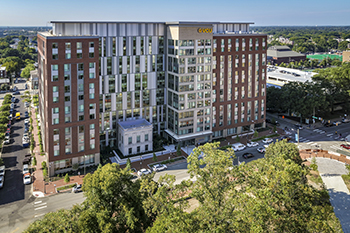
isolation housing at VCU’s Gladding Residence Center III. Photo by Allen Jones, VCU Marketing
Some classes this semester will be held in person, others will be online and some will be taught via a hybrid of online and in-person attendance.
Other large state universities such as Virginia Tech, the University of Virginia and George Mason University, as well as numerous other private and state universities, also are bringing students back to campus for in-person and online classes with extraordinary health measures in place.
‘Uncharted territory’
Aside from students, the pandemic also has altered life for VCU’s 2,600 full-time instructional staff.
“This has probably been the most challenging time of my life going through a pandemic, being quarantined and all the things related to that,” says Valerie Robnolt, vice president of the VCU Faculty Senate and an associate professor in the School of Education.
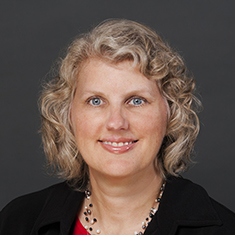
“I don’t want to be too political, but we need more money for education to do this safely,” she says.
Rao, along with the presidents of Virginia Tech and U.Va., publicly asked the state to set aside $200 million to increase coronavirus testing on college campuses and elsewhere.
Robnolt says many faculty members at VCU have been working without pay this summer — they work nine-month contracts — in order to prepare for the fall semester.
Like many other colleges, VCU will offer an abundance of online classes this fall. The college administration decided early on that all classes with more than 50 students will be taught remotely.
Aside from the coronavirus, VCU saw another new development this summer: nightly Black Lives Matter protests around its campus and the surrounding neighborhoods. In July, the university sustained approximately $100,000 in damage to its Monroe Park Campus, including smashed windows and graffiti. Many students have taken part part in the largely peaceful protests. In several instances, police have used nonlethal weapons, including tear gas and pepper spray to dispel protesters.
In a message to the university, Rao wrote, “VCU supports free speech and stands in solidarity with those peacefully expressing messages of social justice and equity for all people. VCU does not condone — under any circumstance — acts of violence or vandalism, regardless of the purported cause. Violence against people and deliberate destruction of property are contrary to the values of our community and will not be tolerated.”

In August, Richmond police arrested a nonstudent, 20-year-old Lucas Couturier, who is facing multiple felony charges in connection with rioting at VCU.
Taylor Maloney, a VCU senior and the incoming president of the student government association, is a party in an ACLU lawsuit filed against the city of Richmond, the Richmond Police Department and the Virginia State Police. Filed in Richmond Circuit Court, the lawsuit alleges that on June 22 Richmond police wrongfully issued a declaration of unlawful assembly against a peaceful teach-in by university students held in front of Richmond City Hall to discuss issues such as police brutality and racial inequality. Police used tear gas, rubber bullets and flash grenades to disrupt the gathering.
In an affidavit filed as part of the lawsuit, Maloney says, “This suit is important because it’s taking an even bigger stand against the unchecked violent and outright malicious behavior exhibited by the Richmond Police.”
In a statement to Virginia Business, Rao notes that amid social change and the coronavirus, he expects life at VCU will be intense this academic year. “The pace of change has been relentless, and we are in an uncharted territory where everyone — all of us — need to adapt quickly and purposefully to information that changes constantly.”
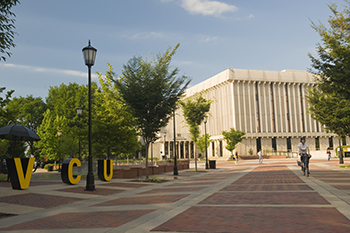
VCU at a glance
Founded: With roots stretching back to 1838, VCU was created in 1968 from the merger of the Medical College of Virginia and Richmond Professional Institute.
Campus: Encompassing 169 acres, VCU is divided into two downtown Richmond campuses: Monroe Park and MCV. It also has the VCUarts Qatar campus in the Middle East and various satellite sites across Virginia.
Enrollment: 28,060 students
Student profile: Full time: 83%; Virginia residents: 86%; Minority: 45%; Enrolled in STEM majors: 23%; International students: 1,170 from 101 nations. Top four: China, India, Saudi Arabia and Kuwait
Employees: 24,234 employees
Faculty: Full-time faculty: 2,551; Part-time adjunct faculty: 910
Tuition and fees, housing and financial aid: In-state tuition and fees: $14,710; Out-of-state tuition and fees: $36,048; Room and board: $11,035
Average financial aid awarded to full-time undergraduates seeking assistance in 2018-19: $17,153
Subscribe to Virginia Business.









